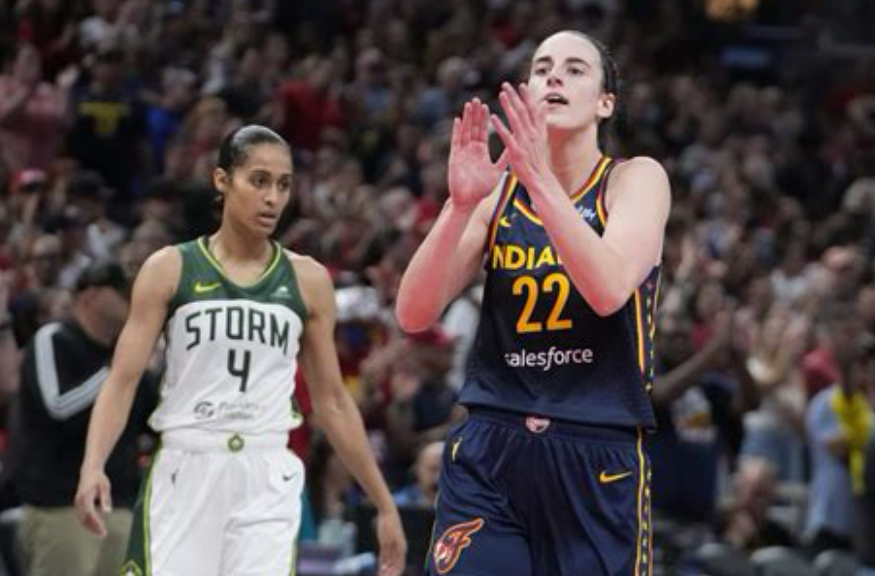In a league known for its rigor, its legends, and its slow-earned accolades, Caitlin Clark has shattered the timeline. With just 42 career games under her belt, Clark now holds the record for the most games in WNBA history with 25 points and 10 assists—a feat that doesn’t just hint at greatness, but declares it.
For any rookie, stepping into the WNBA is a reality check. The tempo quickens. The defenses tighten. The margin for error shrinks. Yet from her very first tip-off, Caitlin Clark has made the extraordinary look routine. Her court vision is panoramic. Her shot is fearless. And her pace? Unrelenting. This isn’t just a young star adapting to the league—it’s a player reshaping it in real time.
From NCAA Icon to WNBA Record-Setter
Caitlin Clark arrived in the WNBA not just with hype, but with history. At Iowa, she became a generational force—a point guard with a shooting range rivaling Steph Curry’s, and a passer’s mind that made every teammate better. Her NCAA performances were electric, her stat lines cartoonish, her presence magnetic. But translating that to the WNBA isn’t a given. Many college stars have arrived with glowing résumés only to falter under professional pressure.
Clark? She accelerated.
Just 42 games into her WNBA career, she’s done what no other player—rookie, veteran, or MVP—has accomplished: the most 25-point, 10-assist games in league history. Not Diana Taurasi. Not Sue Bird. Not Sabrina Ionescu. Clark’s achievement isn’t just about putting up numbers. It’s about sustaining high-efficiency playmaking and scoring against the most seasoned defenders in the world.
The Anatomy of the 25/10 Game
To understand the magnitude of Clark’s record, it helps to dissect the dual nature of the feat. Scoring 25 points in a WNBA game is no small task—it requires volume, efficiency, and adaptability. Defenses are too smart to allow the same look twice. Yet Clark consistently finds her shot across the arc, mid-range, and off the dribble.
But adding 10 assists to that stat line elevates the achievement to another stratosphere. Assists aren’t just about finding open teammates—they’re about manipulating defenses, reading coverage in motion, and delivering precision under pressure. It’s a sign of total court control, something rarely seen in young guards, let alone rookies.
For Clark to hit these marks repeatedly in her first season suggests a player who is not just physically gifted, but mentally evolved. She’s reading the floor like a veteran, improvising like a scorer, and orchestrating like a maestro. The result? A style of play that is as statistically dominant as it is aesthetically thrilling.
Redefining Rookie Standards
Traditionally, rookies in the WNBA are expected to learn, adjust, absorb. Even the most talented first-year players usually spend time deferring to veterans, adapting to the league’s physicality, and working out the pace. Clark, however, has skipped that narrative entirely. Her impact has been immediate and disruptive—in the best way.
She’s scoring like an All-Star, assisting like a floor general, and doing so while leading her team into competitive contention. Her transition from college to pro has not been incremental—it’s been meteoric.
Even among the most iconic rookies—Candace Parker, Tamika Catchings, Maya Moore—Clark’s early-season output stands apart for its dual-threat composition. Parker was a scoring and rebounding machine. Moore was a relentless finisher and defender. But Clark’s dual dominance in both playmaking and scoring is a rare statistical fingerprint.
Beyond the Numbers: What Clark Brings to the League
Statistics may underline her greatness, but Clark’s value extends beyond the box score. She is the center of gravity in every game she plays. Defenses are warped by her range. Teammates are emboldened by her vision. The pace of play shifts when she’s on the court.
Off the floor, her presence is arguably even more impactful. Clark has become a media magnet and attendance boon, driving record ticket sales, sellouts, and national broadcasts. Her jersey tops sales charts. Her highlights dominate social feeds. And her charisma, both candid and competitive, has become a new face for the league’s marketing efforts.
In just a few months, she has become one of the WNBA’s biggest stars—not by promise, but by proof.
Comparison is Inevitable, But Clark is Singular
It’s tempting to search for comparisons—Sue Bird’s IQ, Diana Taurasi’s fire, Steph Curry’s range. But Caitlin Clark defies easy analogy. She’s a unique convergence of scoring aggression, court vision, and tempo control, all wrapped in an unshakable confidence.
Her passes aren’t just accurate—they’re intentional acts of art, bending angles and unlocking space. Her shot selection isn’t reckless—it’s calculated improvisation, shaped by an intuitive understanding of momentum and rhythm. And perhaps most importantly, her game is inwardly fueled, never seeking validation, only expression.
That’s why the 25/10 benchmark matters so much. It’s a statistical reflection of a philosophical approach to basketball—a belief that you can score big without sacrificing team fluidity, that you can be a star and a servant at the same time.
What Comes Next?
If this is what Clark has done in 42 games, what does game 100 look like? Or year three? Or year ten?
The scariest part of Clark’s trajectory is how much room she still has to grow. Her efficiency can improve. Her turnovers can tighten. Her defensive reads will sharpen. But even at this early stage, she’s already outpacing legends—not just in fanfare, but in tangible production.
The WNBA is no longer waiting for Clark to develop. It’s responding to her dominance, recalibrating its scouting reports, adjusting its matchups, and acknowledging that she’s no longer a promising rookie—she’s an unavoidable force.
The Hustle
Caitlin Clark didn’t sneak into WNBA history—she kicked the door open. In just 42 games, she’s proven that the future of women’s basketball isn’t something we have to anticipate. It’s already here, crossing over defenders, sinking 30-foot threes, and throwing laser assists through traffic.
The 25-point, 10-assist record is a milestone, yes. But more than that, it’s a message: that greatness doesn’t always wait its turn. Sometimes, it shows up ready, relentless, and unapologetically brilliant. And Caitlin Clark is all of that—and still ascending.
No comments yet.








